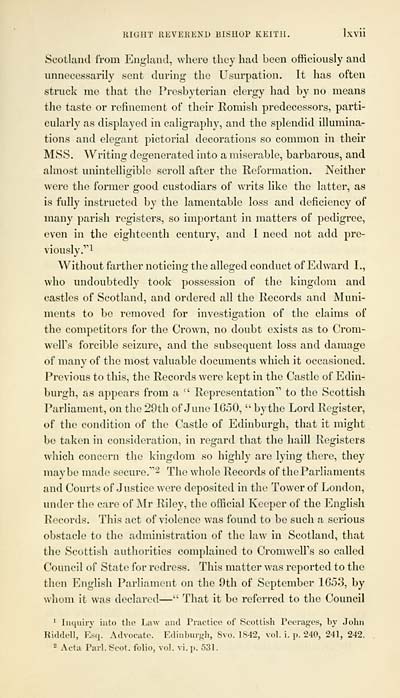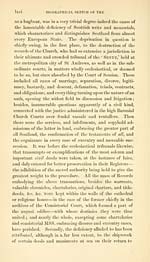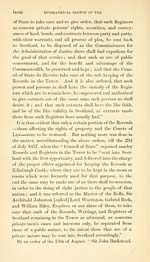Spottiswoode Society > History of the affairs of the Church and State of Scotland from the beginning of the reformation to the year 1568 > Volume 1
(75) Page lxvii
Download files
Complete book:
Individual page:
Thumbnail gallery: Grid view | List view

RIGHT REVEREND BISHOP KEITH. lwii
Scotland from England, where they had been officiously and
unnecessarily sent during the Usurpation. It has often
struck me that the Presbyterian clergy had by no means
the taste or refinement of their Romish predecessors, parti-
cularly as displayed in caligraphy, and the splendid illumina-
tions and elegant pictorial decorations so common in their
MSS. Writing degenerated into a miserable, barbarous, and
almost unintelligible scroll after the Reformation. Neither
were the former good custodiars of writs like the latter, as
is fully instructed by the lamentable loss and deficiency of
many parish registers, so important in matters of pedigree,
even in the eighteenth century, and I need not add pre-
viously ."i
Without farther noticing the alleged conduct of Edward I.,
who undoubtedly took possession of the kingdom and
castles of Scotland, and ordered all the Records and Muni-
ments to be removed for investigation of the claims of
the competitors for the Crown, no doubt exists as to Crom-
well's forcible seizure, and the subsequent loss and damage
of many of the most valuable documents which it occasioned.
Previous to this, the Records were kept in the Castle of Edin-
burgh, as appears from a " Representation' 11 to the Scottish
Parliament, on the 29th of June 1650, " by the Lord Register,
of the condition of the Castle of Edinburgh, that it might
be taken in consideration, in regard that the haill Registers
which concern the kingdom so highly are lying there, they
maybe made secure.'"' 2 The whole Records of the Parliaments
and Courts of Justice were deposited in the Tower of London,
under the care of Mr Riley, the official Keeper of the English
Records. This act of violence was found to be such a serious
obstacle to the administration of the law in Scotland, that
the Scottish authorities complained to Cromwell's so called
Council of State for redress. This matter was reported to the
then English Parliament on the 9th of September 1653, by
whom it was declared — " That it bo referred to the Council
1 Inquiry into the Law and Practice of Scottish Peerages, by John
Riddell, Esq. Advocate. Edinburgh, 8vo. 1842, vol. i. p. 240, 241, 242.
2 Acta Pari. Scot, folio, vol. vi. p. 531.
Scotland from England, where they had been officiously and
unnecessarily sent during the Usurpation. It has often
struck me that the Presbyterian clergy had by no means
the taste or refinement of their Romish predecessors, parti-
cularly as displayed in caligraphy, and the splendid illumina-
tions and elegant pictorial decorations so common in their
MSS. Writing degenerated into a miserable, barbarous, and
almost unintelligible scroll after the Reformation. Neither
were the former good custodiars of writs like the latter, as
is fully instructed by the lamentable loss and deficiency of
many parish registers, so important in matters of pedigree,
even in the eighteenth century, and I need not add pre-
viously ."i
Without farther noticing the alleged conduct of Edward I.,
who undoubtedly took possession of the kingdom and
castles of Scotland, and ordered all the Records and Muni-
ments to be removed for investigation of the claims of
the competitors for the Crown, no doubt exists as to Crom-
well's forcible seizure, and the subsequent loss and damage
of many of the most valuable documents which it occasioned.
Previous to this, the Records were kept in the Castle of Edin-
burgh, as appears from a " Representation' 11 to the Scottish
Parliament, on the 29th of June 1650, " by the Lord Register,
of the condition of the Castle of Edinburgh, that it might
be taken in consideration, in regard that the haill Registers
which concern the kingdom so highly are lying there, they
maybe made secure.'"' 2 The whole Records of the Parliaments
and Courts of Justice were deposited in the Tower of London,
under the care of Mr Riley, the official Keeper of the English
Records. This act of violence was found to be such a serious
obstacle to the administration of the law in Scotland, that
the Scottish authorities complained to Cromwell's so called
Council of State for redress. This matter was reported to the
then English Parliament on the 9th of September 1653, by
whom it was declared — " That it bo referred to the Council
1 Inquiry into the Law and Practice of Scottish Peerages, by John
Riddell, Esq. Advocate. Edinburgh, 8vo. 1842, vol. i. p. 240, 241, 242.
2 Acta Pari. Scot, folio, vol. vi. p. 531.
Set display mode to: Large image | Transcription
Images and transcriptions on this page, including medium image downloads, may be used under the Creative Commons Attribution 4.0 International Licence unless otherwise stated. ![]()
| Permanent URL | https://digital.nls.uk/79597688 |
|---|
| Description | Volume I. |
|---|---|
| Attribution and copyright: |
|

